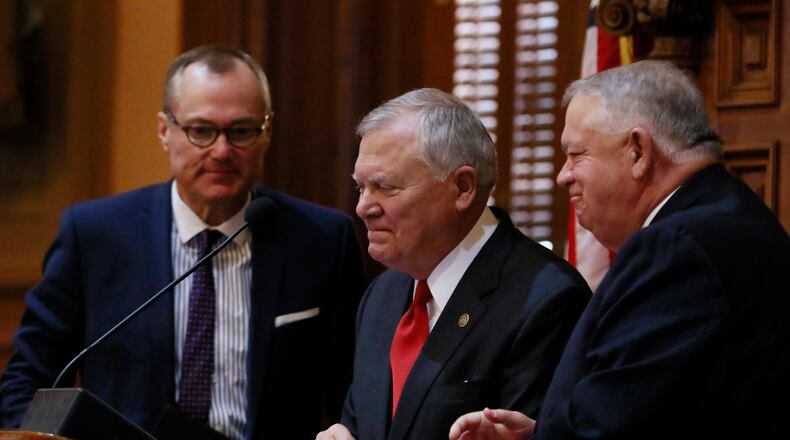The 40-day legislative session came crashing to a halt early Friday, and state lawmakers who spent the last three months hashing out hundreds of measures now await Gov. Nathan Deal's decisions on their priorities.
Friday marks the start of a 40-day period to sign measures into law or veto them. And Deal has shown he's not afraid to wield the red pen. He nixed the two most consequential bills of last year's session: A "campus carry" measure and a "religious liberty" bill.
Both those ideas were back this session, in various forms, and at the center of last-minute fights in the General Assembly.
So were a range of other high-profile measures that are already waiting on Deal's desk. And he's already signed a handful of other proposals, including a $24 billion midyear spending plan and a three-year extension of a hospital provider fee to shore up Medicaid funding.
Here’s an early rundown of where some of the biggest bills stand:
Campus carry
Lawmakers have tried for years to allow people with special weapons permits to carry concealed weapons on most parts of public colleges, and last year they sent a bill to his desk that would do just that. But lawmakers defied his personal request for changes that would make exceptions to the expansion, and he issued a forceful veto of the measure. Lawmakers agreed to a late compromise that acceded to the carve-outs Deal demanded last year.
What Deal has said: The governor has kept the door open to the measure this year, as long as it includes some of the changes he wants. "We're receptive to continuing to talk with them, and hopefully they're receptive to making some additional changes," he said earlier this month. "Perhaps. But whether they do or don't, that's their decision."
Status: Deal has not said whether he will sign it, but lawmakers worked with his office on the measure and it met all his demands. Our bet is he will sign it.
Failing schools initiative
After the resounding defeat of the governor's Opportunity School District plan, lawmakers quickly developed a "plan B" that would give the state new powers to intervene in struggling schools. While not as far reaching as Deal's failed constitutional amendment, the "First Priority Act" would create a chief turnaround officer with authority to appoint "coaches" to help schools improve. Those that don't after three years could be turned over to private managers.
What Deal has said: The governor made the failing schools initiative the cornerstone of his second term, and he has said the measure was his stop priority this legislative session. Although he played a behind-the-scenes role, he largely let House and Senate lawmakers take the lead on the plan.
Status: Deal has said he will sign it.
Medical marijuana
Georgia lawmakers struck a compromise that would expand the state's medical marijuana program by making six new conditions eligible for treatment with a limited form of cannabis oil: Alzheimer's disease, AIDS, autism, epidermolysis bullosa, peripheral neuropathy and Tourette's syndrome. Patients in hospice care also could possess the oil.
What Deal has said: The governor has long been skeptical of changes that would legalize the in-state growing and manufacturing of cannabis oil, but he has warmed to a limited expansion of the program to cover more illnesses.
Status: Deal seems likely to sign it.
Sanctuary campus
Shortly after Donald Trump’s election, House conservatives introduced a proposal that would ban private colleges that don’t cooperate with federal immigration policies from getting state funding for research and scholarships. There are none of these so-called “sanctuary campuses” in Georgia, although two universities flirted with the idea.
What Deal has said: The governor has said very little publicly about this measure, which is popular with the party's conservative base.
Status: Your guess is as good as mine, but our hunch is he'll sign it.
Here are two other scuttled measures that would have posed problems for the governor:
Adoption
Georgia lawmakers have been working for years on a move to modernize the state's decades-old adoption laws, and Deal and House lawmakers were pleased with a measure sponsored by state Rep. Bert Reeves. But a late push to inject a "religious liberty" element to the bill that would allow some private agencies to refuse to place children with same-sex couples has put in jeopardy.
What Deal has said: He has repeatedly said he wants a "clean" adoption bill without the religious liberty addition, and has threatened to veto the measure if not.
Status: The House and Senate couldn't forge a deal over the measure, and it failed in the final minutes of the session.
Taxes
The House and Senate failed to negotiate a truce over legislation backed by the Senate that would provide a $200 million income tax cut – mostly to wealthier residents – and could force e-retailers to collect sales taxes on what they sell.
What Deal has said: The governor has warned lawmakers to defy the "temptation" of broad tax increases that could jeopardize the state's fiscal health. "Sometimes, it is easier to make hard decisions in bad times than it is in good times," he said. "In good times you're susceptible to making bad decisions."
Status: Advocates will have to wait until next year.
About the Author
The Latest
Featured




